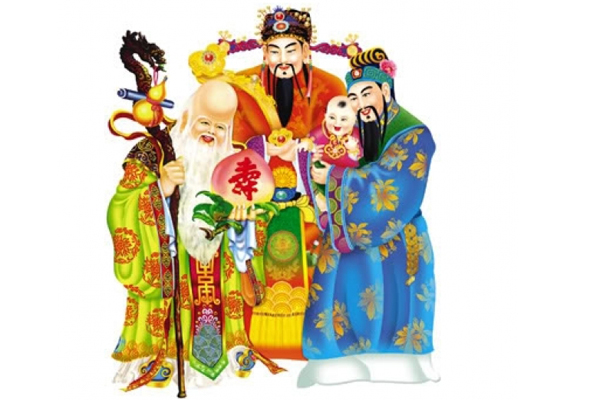European and American friends often ask me the meaning of the ideogram "phuc" embroidered on silk shawls or blouses or engraved on silver medals at gift shops in the old quarter.
The Chinese character, pronounced "fu” in Chinese and ’'fook" in Vietnamese, besides ‘happiness’ also means ’chance’, ’fortune’, ’goodluck’ coming from the heaven or stemming from the virtue of one’s ancestors.
It expresses a concept of happiness common to all Confucian societies (of China, Korea, Japan and Vietnam) and is part of a culture marked by the predominance of wet-rice cultures with a peasant and patriarchal character.
One may note that the figure at the lower right corner of the ideogram represents a chessboard-like area of rice fields: didn’t happiness consist primarily in ownership of land?
Over the centuries, the notion of happiness has taken on several variants.
It includes five components: wealth, longevity, honors, peace, tranquility which might switch to wealth, longevity, calmness and tranquility, the love of virtue, and a natural painless death, depending on compound nouns formed with the element of 'happiness'. It may be embodied in three divinities represented in folk drawings or porcelain statuettes: Happiness, carrying in his arms a child, the latest-born in his long line of descendants; Wealth, a mandarin onto whom favors are poured by the king and gifts presented from the people; and Longevity, an old man with a healthy complexion and a white beard holding the peach of the immortals in his palm. These figures are called the Three Abundances.

The character "happiness" is often associated with the image of a bat because the name of this animal is pronounced in the same way. This had given rise to a frequent decorative motif in Chinese and Vietnamese art: carvings and drawings representing bats are expressions of desire for happiness.
Morality plays an important role in Confucian societies. Thus, the word "happiness" soon took on a moral connotation. Doing good brings “happiness" not only to oneself but also to one's descendants. This semantic evolution of the concept no doubt stems from the influence of Buddhism. Buddhists say "to do happiness" to express the idea of charity. A beggar asking for alms will entreat people to "do happiness". The notion of moral virtue is grafted on that of happiness, hence the expressions "happiness and virtue" and "happiness inherited from virtuous parents".
My former philosophy teacher indulged in talking about transcendental virtue, a kind of magic force. He noted: “Magic force, chance, wealth, virtue — the semantic evolution of "happiness" to not without similarity to that found in certain Indogermanic languages. A similar transformation has likewise provided the Sanscrit word "karma" with the moral connotation it acquired in



